Even with excellent business cloud storage and online backup platforms like Backblaze and Egnyte, a dedicated, physical server can do a lot for your small business. In addition to giving you control over how your data is stored, the best small business server should provide redundancy, expandability and upsides in security.
We’ve gathered five servers that do the trick for small business, and another two honorable mentions. It doesn’t matter if you need a basic file server or a machine-learning powerhouse; there’s an option for you here.
Key Takeaways:
- Small business servers can be expensive, but they don’t need to be.
- Out of the many things to consider when choosing a small business server, expandability might be the most important.
- Servers are built for 24/7 operation, making a dedicated machine a better option than an old computer.
Out of all of the small business servers, we rate the HPE ProLiant ML350 Gen10 highest. Although there are better options depending on what you need, the ML350 offers a solid balance of price, performance and expandability, making it an ideal choice for just about any task.
What Is a Small Business Server?
In its most basic form, a server is a network-attached computer that’s built to run 24/7. The components that make up a server are the same ones that make up a standard computer — a processor, some RAM, storage drives, a motherboard and a power supply. The difference is that server parts are built to run around the clock.
For example, power supplies have further validation and many of the internal components have built-in redundancy, ensuring that your server stays running even if a part fails. That’s the main thing that separates standard computers from servers, though there are a few other important differences.
Differences: Computers vs Servers
First, servers don’t run the same operating systems as desktop machines. Although you can start a Windows server, many servers use other operating systems, such as Ubuntu Server and FreeNAS. These lightweight operating systems aren’t built for the end user, favoring function over form in most cases.
The components themselves are slightly different, too, even outside of stability. While desktop machines usually favor fewer, faster cores, servers generally favor greater, slower cores. While consumer processors top out at 16 cores, server processors go much higher. AMD’s Epyc server CPUs, for example, reach up to 64 cores.
That shows in storage, too. Although you can use a server for various different tasks — we’ll detail a few of them next — most server operations call for a lot of storage. Servers offer greater expandability versus desktop machines, and they usually come with hot-swappable drive bays.
Why Do I Need a Small Business Server?
The need for a small business server is actually decreasing, especially as cloud storage and online backup options become more accessible and feature-rich. That said, there are some reasons to use a physical server over cloud servers from Google, Amazon and the like.
Security
Security is a key reason. Although cloud servers usually come with a range of security features, you still have to transfer data across the internet. Local security can pose issues, too. However, if you have sensitive data that’s only going to be used internally, it makes more sense to have that data stored locally, on your server.
Expandable Space
Physical business servers also allow you to quickly expand your storage space if you need it, as well as pass that data off to redundant storage. This is especially important if your business deals with very large files. Although 100TB of storage is chump change for on-premises servers, it can get costly if you’re dealing with a cloud solution.
Price
Similarly, cloud networks like AWS (check out our AWS guide if you’re unfamiliar with the service) and Azure (read our Microsoft Azure review) charge by the hour. Like any physical versus digital good, you actually own a server if you purchase one, allowing you to use its computing power as much as you want.
The main question is what you can use that computing power for. The answer, as it is with most things, is that it depends. There are three basic functions: as a file server, as a web hosting server or database and as an email hosting server. Most small businesses will need a server for one of those functions, though a server can do much more.
What Makes the Best Server for Small Business?
Choosing a small business server is all about accessibility and expandability. Servers, like any business-focused hardware, can get expensive quickly. Although we didn’t make our picks with a hard price limit in mind, we avoided servers that run tens of thousands of dollars for a decent configuration.
We selected servers you can spend tens of thousands of dollars on, though. Expandability is essential when it comes to choosing a server. Although you may only need a little bit of RAM and a few terabytes of storage now, you’ll likely need more in the future. Our picks allow you to expand as you need.
Then, there are the other, less exciting criteria. These include connectivity options, networking bandwidth, cooling, embedded management software and form factor. Here are our top five small business server options.
- HPE ProLiant ML350 Gen10 — The perfect balance of price, power and expandability.
- — Cheap and fully featured, the T40 is perfect for any lightweight tasks.
- Lenovo ThinkSystem SR550 — A rackmount server that can actually fit in a larger data center.
- Dell PowerEdge T640 — It’s expensive, but the PowerEdge T640 comes with the features businesses need.
- Synology DiskStation DS220j — An affordable NAS unit for local file storage.
Although we built our list in a way that you can choose any server and have a positive experience, some of the picks are better suited for certain situations. The , for example, is a great all-purpose file server for businesses that don’t need a lot of computing power, while the Lenovo ThinkSystem SR550 is built to start a larger server ecosystem.
Our top pick, the HPE ProLiant ML350 Gen10, stands above the rest, though. It balances price against decent base specs and a lot of room to expand, making it an ideal server for just about any small business.
What Is the Best Server for a Small Business?
With some background on what a server is and what one can do for your small business, let’s dive into our top five picks.
Affordable and packed with features, HPE’s tower ML350 is perfect for most businesses.
Pros:
- Dual Xeon processor sockets
- Multiple expansion options
Cons:
- High-end configs are pricey
The HPE ProLiant ML350 Gen10 comes from HP — the “E” at the end is for “enterprise.” It’s HP’s top-of-the-line tower server, sporting an Intel Xeon Bronze 3206R, 16GB of memory, a 500 watt power supply and four full-sized drive bays in its base configuration. Although the base configuration only comes with a single processor, the ProLiant ML350 can actually support two.
The Xeon 3206R inside is plenty to power an email server, network attached storage, or a database server, and 16GB of RAM helps. If you need more, you can configure the ProLiant ML350 much higher than its base configuration. That includes up to an Xeon Gold 5218R, 32GB of RAM and dual 800 watt power supplies.
As is the case with any good small business server, you can add your own server components, too. The Xeon processors, no matter the model you choose, support up to 1TB of ECC memory, and the ML350 provides 12 memory slots, giving you plenty of room to expand.
| Configuration | Cheapest | Most Expensive |
|---|---|---|
| Price: | Around $1,200 | Around $2,700 |
| CPU: | 1 x Intel Xeon Bronze 3206R | 1 x Intel Xeon Gold 5218R |
| RAM: | 16GB ECC | 32GB ECC |
| Drive Bays: | 4 x large form factor, 8 x small form factor | 4 x large form factor, 8 x small form factor |
| Power Supply: | 1 x 500 watt | 2 x 800 watt |
The base unit comes with a single drive cage for up to eight small form factor or four large form factor drives. However, you can add another two cages, offering space for up to 24 small form factor or 12 large form factor drives.
You can repurpose the machine, too. Eight PCIe 3.0 slots allows you to slot new cards in (including up to 100Gb Ethernet), and you can convert the tower into a 5U rack server. Powerful and highly expandable, the ProLiant ML350 is perfect for small business solutions.
2.
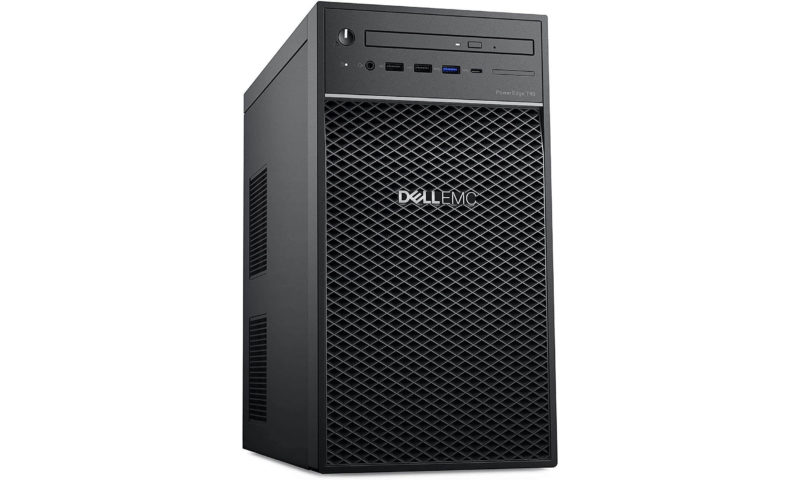
The Dell PowerEdge T40 is an inexpensive way to access a high-powered server.
Pros:
- Inexpensive
- Great connectivity options, internally & externally
Cons:
- Less expandability than other options
The cheapest server on this list, the PowerEdge T40 offers a way to invest in a dedicated server for your small business without the upfront cost. The base configuration offers some decent specs, including a quad-core Intel Xeon E-2224G, 8GB of DDR4 ECC memory and a 1TB hard drive.
Although much less horsepower than the Proliant ML350, the PowerEdge T40 can still play the role of an entry level file server or web server. It stays in the entry level range, though. You can add another two hard drives with support for up to 12TB of storage, as well as up to 64GB of RAM.
| Configuration | Cheapest |
|---|---|
| Price: | Around $500 |
| CPU: | 1 x Intel Xeon E-2224G |
| RAM: | 8GB ECC |
| Drive Bays: | 3 x large form factor |
| Power Supply: | 1 x 300 watt |
There’s more PCI expandability, though. You have access to a single PCIe 3.0 x16 slot, two PCIe 3.0 x4 slots and a single PCI slot. The T40 also comes with all the connectivity you need, supporting six USB 3.1 ports between the front and back, as well as gigabit Ethernet.
We can’t downplay Dell’s business support, either. Although Dell’s personal product support is a bit lacking, its business support is excellent. Standard with the T40, you get one year of next business day hardware support, with the option of purchasing four-hour, “mission critical” support.
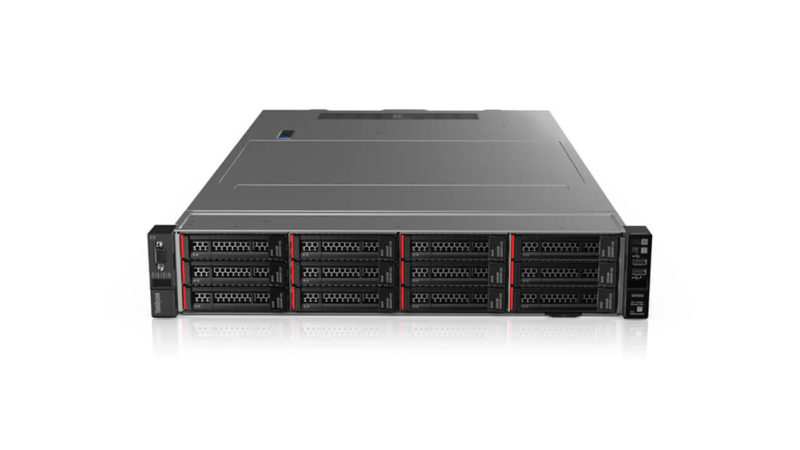
The Lenovo ThinkSystem SR550 is a small business server with enterprise ambitions.
Pros:
- Massive room to expand
- Excellent hardware selection across configs
Cons:
- Expensive
- Requires a server rack
The Lenovo ThinkSystem SR3550 is a 2U rackmount server, and it’s one of the most inexpensive ways to start building your server rack. It’s a highly scalable unit that offers all of the features a growing business needs: a lot of PCIe expansion, an array of hot-swappable drive bays, software RAID support and support for dual second-generation Xeon Platinum processors.
If you want room to grow, the ThinkSystem SR550 provides it. The base model comes with a single Xeon Bronze 3204 six-core processor, 16GB of memory and hot-swap drive bays for up to 12 SFF or 8 LFF drives. There’s also an option to expand the bays for up to 16 hot-swap SFF drives. The SR550 can support dual power supplies, too.
| Configuration | Cheapest | Most Expensive |
|---|---|---|
| Price: | Around $1,500 | Around $15,800 |
| CPU: | 1 x Intel Xeon Bronze 3204 | 2 x Intel Xeon Platinum 8256 |
| RAM: | 16GB ECC | 384GB ECC |
| Drive Bays: | 8 x large form factor, 12 x small form factor | 8 x large form factor, 16 x small form factor |
| Power Supply: | 1 x 550 watt | 1 x 750 watt |
Additionally, the SR550, along with all ThinkSystem machines, comes with Lenovo’s XClarity Controller. This embedded management engine makes it easy to perform server maintenance and automate mundane tasks. It works across ThinkSystem servers, too, allowing you to expand your hardware lineup in the future.
The ThinkSystem SR550 is a small business server with enterprise aspirations — and it will also work well for small businesses that just need a lot of computing horsepower. The base specs are more than enough to get started. However, with the wealth of expandability and Lenovo’s excellent XClarity Controller, the SR550 is also a great way to set a foundation for a larger data center.
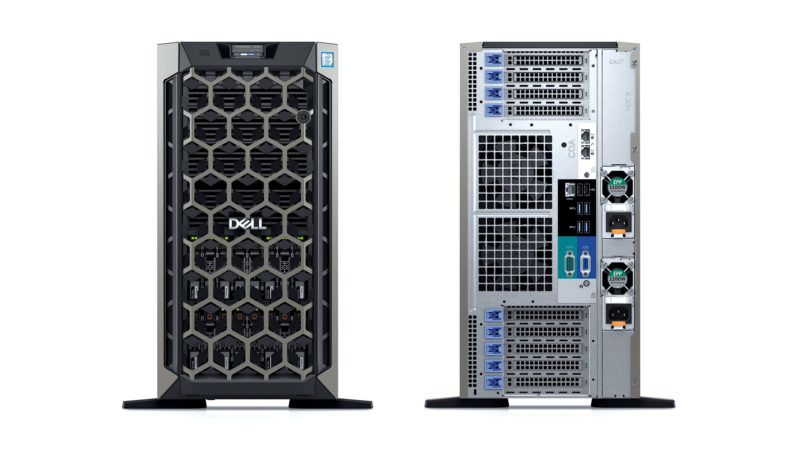
It’s expensive, but the Dell PowerEdge T640 comes packed with high-end features.
Pros:
- Dual 10Gb Ethernet ports
- Hardware RAID support
The T40 is Dell’s most inexpensive tower server, while the T640 is the most expensive. With dual Intel Xeon sockets, support for up to 216TB of storage, dual 10Gb Ethernet and a slew of PCIe 3.0 x16 slots, the T640 clearly shows where the extra cost is going.
The PCIe slots and dual 10Gb Ethernet ports stick out, here. If you plan on using your server for any tasks that can take advantage of GPU acceleration, such as machine learning, the extra ECIe slots will come in handy. The T640 can support up to four 300 watt or eight 150 watt GPUs, such as the Nvidia Tesla P100.
| Configuration | Cheapest | Most Expensive |
|---|---|---|
| Price: | Around $1,300 | Around $6,300 |
| CPU: | 1 x Intel Xeon Bronze 3204 | 1 x Intel Xeon Gold 5218 |
| RAM: | 8GB ECC | 32GB ECC |
| Drive Bays: | 8 x large form factor | 8 x large form factor |
| Power Supply: | 1 x 495 watt | 1 x 495 watt |
Dual 10Gb Ethernet just ensures that data going to and coming from your server travels as fast as possible. Although 100Gb Ethernet is still ideal, 10Gb still offers plenty of headroom for most local networks. It’s a standard feature, too, and you can always expand to 100Gb Ethernet using a free PCIe slot.
Other standard features include hardware RAID support, Dell’s range of EMC server tools, hot plug power supplies with full redundancy and up to eight hot plug fans (also with full redundancy). The PowerEdge T640 is a scalable small business solution, and although expensive, the extra cost is worth it.
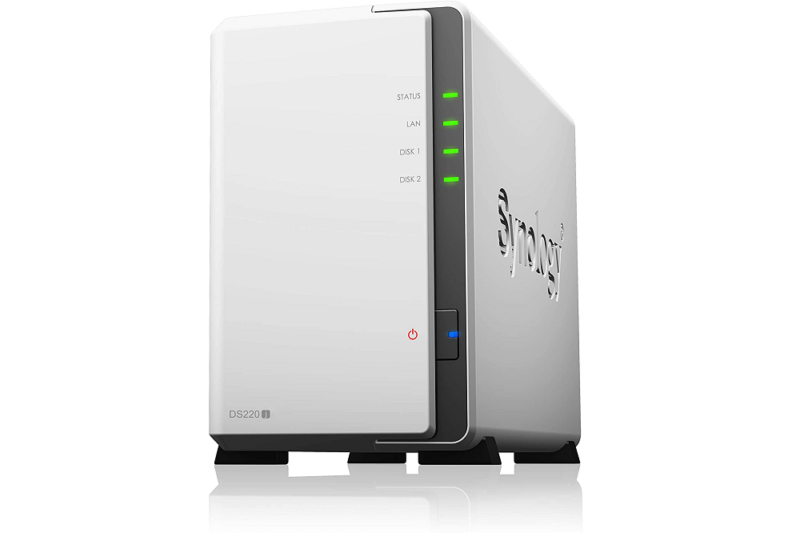
The Synology DiskStation DS220j is a dual-bay NAS that makes basic file storage a breeze.
Pros:
- Very affordable
- Dedicated operating system
- Android & iOS apps
If all your business needs is local file storage, you can likely get away with network-attached storage. A NAS unit is basically a stripped down computer, focusing on storing and sharing files over the network instead of harnessing computing power — and Synology is probably the biggest name on the market.
The DiskStation DS220j is all you need for basic file storage. It’s a diskless unit with two drive bays, 512MB of RAM, and a quad-core processor. The unit can accept up to two 16TB hard drives, depending on your RAID configuration (the DS220j supports RAID 1, 0 and Synology Hybrid RAID).
| Configuration | Cheapest |
|---|---|
| Price: | Around $170 |
| CPU: | Quad-core 1.4GHz |
| RAM: | 512MB |
| Drive Bays: | 2x large form factor |
| Power Supply: | N/A |
Additionally, the unit comes with a suite of useful software. The dedicated operating system is built for managing your files, and the DS220j comes with backup, media playback and syncing software. Synology offers Android and iOS apps, too, allowing you to manage your files on the go.
Best Small Business Server: Honorable Mentions
We have two more small business server recommendations that couldn’t quite make the cut on our full list. These servers are much more expensive than the options above, which is why we didn’t include them in the main list.
ASUS TS100
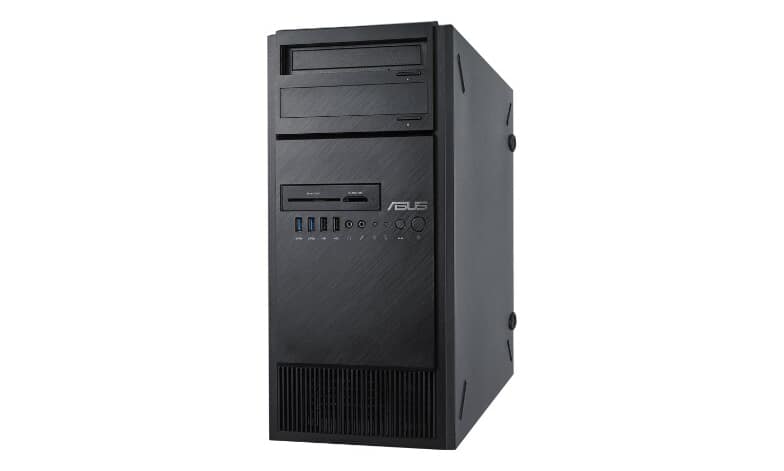
The ASUS TS100-E10 is a barebones server that offers a great foundation to start building your own server.
The ASUS TS100 is one of the cheapest ways to start building a server from scratch. It’s a barebones unit that comes with all of the features and connectivity you need to build your own server. Even better, it’s much cheaper than any of the other options on this list, costing around $300.
You’ll need to spend more, though. The TS100 doesn’t come with a CPU, RAM or any storage — it is a barebones system, after all. It does feature an Intel C242-powered motherboard with dual M.2 slots, dual Intel gigabit Ethernet and the ASUS Control Center, a centralized platform for managing any servers or workstations in your array.
The downside is that you have to add your own components, but the upside is that you get to choose your own components. The four DIMM slots support up to 128GB of ECC memory, and the Intel motherboard supports Xeon E family processors with its LGA 1151 socket. It also comes with six SATA 6 connections, supporting RAID 0, 1, 5 or 10.
Additionally, the dual M.2 drives support RAID 1 or 0. We have a dedicated guide on what RAID is, but in short, RAID 0 can stripe data to provide up to 84 percent faster read and 40 percent write speeds (according to ASUS), and RAID 1 can store the same data on both drives for better reliability.
ASUS ESC8000 G4
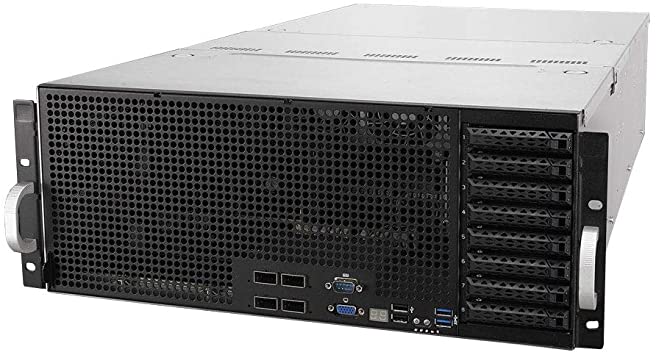
The ASUS ESC8000 is overkill by just about every metric, but it has the connections and space to be a powerhouse.
The ASUS ESC8000 is a barebones server, but you wouldn’t know that from its huge price tag. Although totally unreasonable for most small businesses, the ESC8000 comes with high-end features like dual 10Gb Ethernet and a dual socket motherboard sporting the Intel C621 chipset.
More importantly, it comes with eight full size, dual slot PCIe connections. You can put anything in those slots, but the configuration is built for eight GPUs to be stacked inside. The server also comes with 24 DIMM slots supporting near 3TB of RAM and dual M.2 slots.
The eight GPU spaces are useful for a number of things, most prominently any video work (encoding, rendering, etc.) and machine learning. It’s a far cry from many of the servers above, but if you have the cash and need for a supercomputer, the ESC8000 provides the framework for it.
Scan 3XS SER T9X2
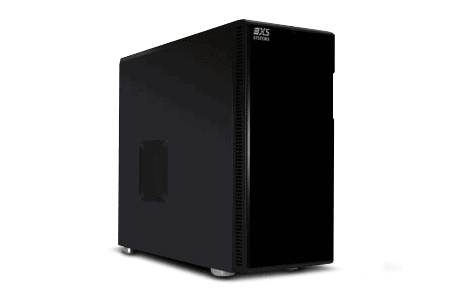
The Scan T9X2 is a server built with off-the-shelf parts, but you can’t buy Scan’s customer service at the store.
The Scan 3XS SER T9X2 — from here on out, simply the T9X2 — is an expensive server with a lot of power. Clocking in at over $4,400 at the time of writing, the T9X2 is simply too expensive. It’s a powerful server, though, and worth the price if you have the cash to spare.
It’s a tower server sporting dual Intel Xeon Silver 4208 processors, 64GB of RAM spread across eight dimms and dual gigabit Ethernet ports. You can expand the T9X2 a lot, too. It has room for eight large form factor drives (plus an optical drive), and can accept up to 768GB of RAM.
Scan uses off-the-shelf parts, too, and comes with excellent product support. The moment after you order your server, Scan provides real-time tracking while the server is being built, including the 24-hour burn test and the 88 point quality assurance check.
Final Thoughts
There’s a lot that goes into choosing a server for your small business. Even with a list of the best options, there’s a lot to consider between expandability, noise, power and price. That’s why we recommend the HPE ProLiant ML350 Gen10 most. Regardless of what you need a server for, the ML350 provides enough horsepower and expandability to accommodate.
However, there are options on other ends of the price spectrum. The Dell T40 is an excellent, inexpensive solution for basic file management, while the ASUS ESC8000 G4 is a monstrously expensive server that can handle even the most intensive computing tasks.
What type of server does your small business need? Did you find the server you’re looking for from our list? Let us know in the comments below and, as always, thanks for reading.
FAQ
-
Many small businesses don’t need a server with the power of cloud computing. However, having a physical server has some security benefits compared to cloud servers, and physical servers are more flexible.
-
Although the setup process for servers is different depending on your configuration and operating system, most small business servers just need a connection to the network, a power cable and a screen to manage the server software.
-
Tower servers use a form factor similar to a desktop computer, while rackmount servers require a rack, taking up a certain number of slots on that rack. There are blade servers, too, which are similar to rack servers, just with a smaller form factor and different mounting system.




